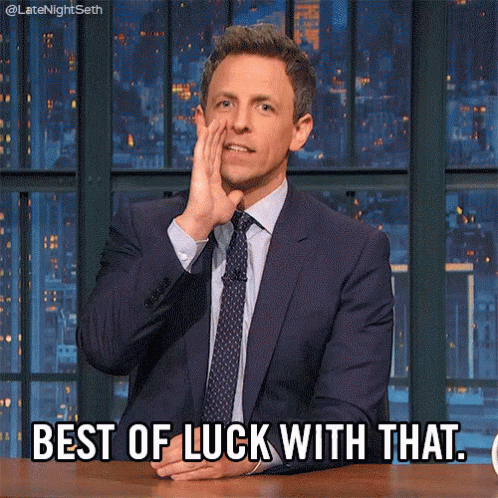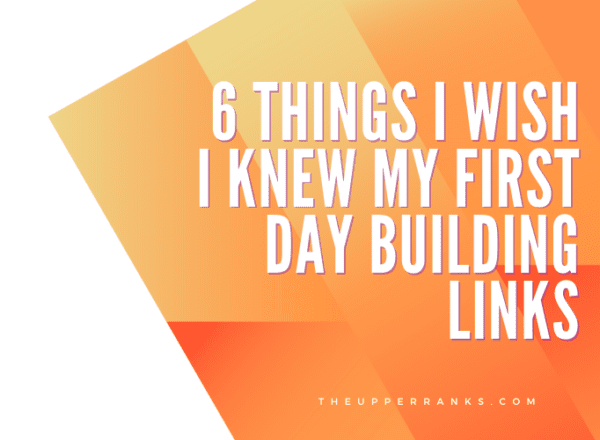Nobody gets to be an expert or a pro on their first day.
Do you think Stephen Curry hit the first three-point shot he ever took? Or that “Romeo and Juliet” was Shakespeare’s first play?
The fundamental difference between an amateur and a professional is experience.
Even if you aren’t naturally blessed with certain skills, when you practice constantly and get some experience under your belt, that experience can compensate for your supposed lack of talent.
I constantly have to remind link builders of this.
No one is born a link builder.
There are certainly some traits a successful link builder will have that come naturally that others may not have.
But for the most part in link building and SEO, experience is the best teacher.
Unless you’re building bad links, no new link builder is going to find immediate success.
Even for people with excellent communication skills, writing your first piece of outreach can be nerve-wracking.
How do you ask for a link without seeming so needy? How do I effectively explain why their site won’t be complete without a link to my site?
And what if, just what if, you get the dreaded:

These are some of the questions that went through my head when I started link building.
So if you’re new to link building, don’t stress!
It’s challenging, but like many things that are challenging, the rewards are plentiful and satisfying when they come.
In the meantime, allow me to help.
Here are a few things I wish I had known the day I started building links.
1. Outreach Isn’t One Size Fit All
There’s nothing wrong with wanting to be as efficient as possible.
In fact, if you’re operating any kind of business and you’re not looking to increase your efficiency and productivity

That said, don’t confuse efficiency for quality.
When I started as a link builder, I put together a rather generic template that I could use for every link building situation. Lather. Rinse. Repeat.
All I had to do was copy/paste this puppy, and the links would come pouring in!
And then reality kicked in. The flood turned out to be a draught.
Effective outreach *requires* personalization.
If you’ve ever operated your own website, even if you only use it sporadically, you know that you get hit with a consistent amount of spam. It gets to the point where you can quickly recognize it just from reading the first two to three sentences. And many times you can spot it based on the subject line.
Now think of someone who runs the linking policy for a site that receives a high amount of traffic.
Do you really think they are going to pore over every word of every mundane email they receive?

That’s why outreach can’t be generic; you need to be creative or personal.
Before you send an email asking for a link, take some time to familiarize yourself with the target site.
Look for something you find interesting; comment on that thing.
Don’t go off on too far of a tangent. Find balance and remember, you’re trying to get their attention, and most webmasters will pass over your 600-word email, even if it’s laced with praise.
But, make sure you don’t get lost in the inbox because you scared them off at first sight. And, never forget my killer secret to outreach 😉
2. Identify Linkable Assets
When you are in the onboarding process with a client, one of the first questions you have for them should be, “What kind of linkable assets do you already have on your site?”
A linkable asset is exactly as it sounds: a page on a site that has such intrinsic value that others will actually want to link to it, with little to no persuasion.
This might seem elementary to the veterans among us, but to a relative rookie who is just learning the ropes, they will almost certainly not understand how to identify what people want to link to.
But being able to identify or create a truly ‘linkable’ asset is an essential step to successfully building links.
You can try reaching out until your fingers grind your keyboard into a fine layer of plastic powder, but no one’s going to link to something that offers zero value.
Linkable assets will contain one or more of the following characteristics:
- It is unique
- It rewards users (either emotionally or materially)
- It features highly valuable information
- It is clever
- It features influencers within the industry
Some of these characteristics are a little bit more subjective. What is “clever” to you might not be to others. However, there are actual methods to separate linkable assets from the rest of the crowd, and they’re quite simple.
Identify the top performing pages on your site. Don’t fret with creating new content when you already have something to work with. If a client’s purported linkable asset is actually a linkable asset, it will likely already stand out in terms of engagement before you’ve even done anything.
You will be better off if you can find the most linkable pages in the onboarding process, rather than treating every page equally.
And if you’ve determined that you need to create a new linkable asset, I’ve got you covered:
- Your Blueprint to Creating Linkable Assets
- Creating Linkable Content (Without A Long-Term Commitment!)
3. Write for an Audience, Not Google
This next one is a more general piece of ‘don’t be an SEO buffoon‘ advice but definitely worth mentioning for newcomers:
Have you ever thought to yourself how good your content is if you’re solely focused on Google?

When I say “focused on Google,” what I mean is writing only for the purpose of exploiting Google’s algorithm, with no care in the world whether or not you’re providing value to an actual human who’s taking time from their day to read what you have to say.
You do hope someone will want to link or share it at the end of the day, right?
Although Google is the largest director of search traffic, it’s usually best to think of Google as a follower, not a leader.
In order to maintain its reputation as the most user-friendly search engine, it’s imperative to Google that they go where the audience is, not that they lead the audience to where they want the audience to go. This isn’t China, after all.
So when you are creating content, write for readers, not search engines.
When you (effectively) write for readers, together with the help of outreach, the links and search engines will follow.
Go ahead and fit your target keywords into the content where necessary or relevant, but never prioritize your keyword strategy over readability.
4. Advanced Search Queries
On average, there are about 5.6 billion Google search queries a day. That’s almost one for every person currently alive. Say what you will about Google, but that universal appeal is unparalleled.
Now, how many of those people who conducted those 5.6 billion searches do you think know what “inurl:” or “related:” means?
Sure, maybe if you explained it to them, they would quickly pick up on the concept.
But how many people know how to use these kinds of advanced search queries on their own volition?
Outside of seasoned Link Builders and SEO’s, I can assure you that the number is not too high.
If you’re new to link building and hope to become a successful link builder, take the time to get a solid grasp on advanced search queries till you know them like the back of your hand.
They might seem confusing and overwhelming at first, but it won’t be too long before you get the hang of them. And you will be saving yourself an enormous amount of time down the road.
5. The Best Tool Is the Human Brain
There are countless tools available to SEOs and link builders. Once you have a firm grasp of how SEO works, many of these link building tools can prove to be extraordinarily helpful and time-saving.
The key phrase in that last sentence is, “Once you have a firm grasp.”
Cranes have been extraordinarily helpful and time-saving for the construction industry. Now imagine the consequences of handing the keys to the crane to someone who is only starting to understand construction/structural engineering?

That might be an extreme metaphor (no one will die if you don’t pull a backlink report correctly), but the point remains the same. You should understand what you’re doing and the environment of what you’re doing before using tools.
There are a few reasons for this.
First off, if you don’t really understand the fundamentals of link building, a few tools might be able to help, but you won’t get maximum efficiency out of them.
Chances are that you or someone else will have to repeat the process down the road, meaning the time-saving benefit is a wash.
The second and more important reason you should stay away from using too many tools off the bat is that you will overcomplicate the link building process, a process that feels very intimidating at first.
I like how my good friend Julie Joyce put it in an article over at SEL:
“You should be able to build links without using any tools….If you want to make it complicated, go for it. You just don’t have to.
Building links is pretty simple and always has been. It’s just that some parts of it are tough.”
She’s 100% correct. While I wouldn’t say that link building is easy, it’s also not complicated, and trying to make it more complicated than it needs to be will cause problems.
So before you start looking into the assortment of wonderful tools that are available, make sure that you know how to build links simply using your brain and a basic tracking spreadsheet.
Once you’ve done that, here are a few that I recommend at least experimenting with:
- Pitchbox
- Buzzstream
- MailShake
- Link Prospector
- And, of course, our Free Link Prospecting Tool
6. Link Like a User, Not an SEO
And finally, the thing I really wish I had known right from the start.
Imagine it’s your first day of law school. You spent the Summer reading every Supreme Court opinion from the previous session, and you digested every article from your preferred legal journal. Now the first thing your professor tells you is to “think like a juror.”
What? You’re here to be an attorney, not to collect a below minimum wage fee as a juror.
While this might seem like preposterous advice right at the moment, it’s actually some of the most astute advice you’ll get, particularly if you’re going into trial law. You might understand law better than anyone in your class, but what good is it if you have no idea how to appeal to a jury?
Just like the American court system depends on the verdict of the unelected populace, so does Google.
Google’s entire business model relies on following the standard internet user, and if you don’t understand what users are looking for, you’re not gonna get very far.

Of SEO malpractice, anyway.
By the same token, when you are building links, always keep users in mind.
Instead of chasing Domain Authority, keep relevance above all else and make sure users will be pleased when they end up at the other end of that link.
And what’s more – not only will users love you for it, but Google will as well.
A topically relevant link will have a bigger impact on your rankings than a link that’s irrelevant.
Think before you build a link.
Make sure it’s somewhere logical and sensible and is a perfect fit for the audience that will be clicking on it.
Don’t mislead the user for better search engine rankings.
Instead, build great links that serve the user well and make the internet a better place.
Conclusion
If you are new to link building, I hope this information didn’t overwhelm you. That’s certainly not my intent.
Whenever you’re picking up a brand new endeavor, everything seems a little overwhelming at first.
But keep all of these tips in mind.
You may not be able to implement them immediately to their fullest effect, but being conscious of these tips will benefit you in the long run.

Comments
Thanks for this! I like the last one in particular : “Link Like a User, Not an SEO” Awesome advice and a reminder as well when linkbuilding.
Quality over quantity: When it comes to link building, the quality of the link is far more important than the quantity. One high-quality link from an authoritative website can be more valuable than multiple low-quality links from irrelevant sources.
I am dead serious, I will use the upper ranks, after reading the whole article, I can tell you guys do quality work. It is so interesting to see insightful info, i do have a question, so, If I have content that is very niche, does that still get ranked high through backlinks?